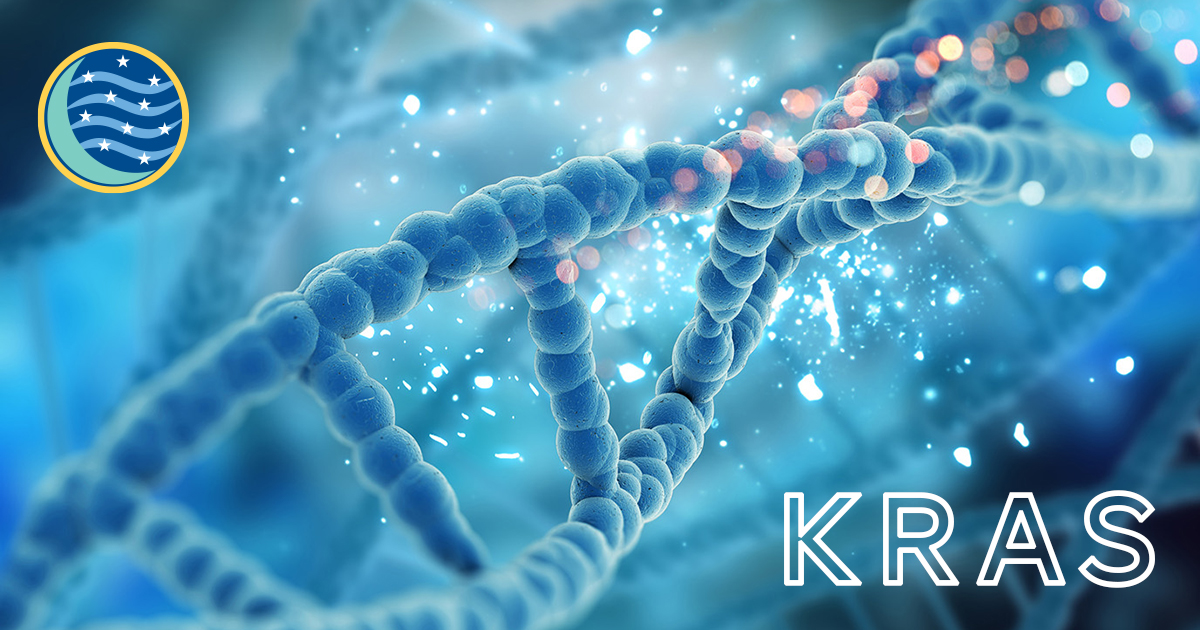Cancer arises from genetic mutations or changes in the DNA that allows cells to grow unregulated. Healthy cells don’t divide unless given signals from the environment to initiate proliferation, mutations that allow a cell to grow, divide, or survive indiscriminately will initiate cancer. The RAS family of genes is made up of KRAS, NRAS, and HRAS and these genes encode proteins involved in telling a cell to start to undergo replication and division. While HRAS and NRAS mutations are found in 2.4 and 5.5% of cancers, respectively, KRAS mutations are the most commonly occurring RAS mutations in cancer found in about 20% of all cancer patients. [1] KRAS is mutated in colorectal cancer, lung cancer, and most prominently in pancreatic cancer.
KRAS mutations are found in over 85% of pancreatic ductal adenocarcinomas (PDACs; the most common form of pancreatic cancer) and are the first mutation, known as the driver mutation, for PDAC kicking off transformation from healthy cell to cancer cell. [1,2,3] KRAS* protein generally exists in its inactive form. When KRAS becomes activated, it signals through multiple pathways that allow a cell to grow, divide, and survive. Mutations in the KRAS gene result in KRAS protein that is always active, disconnecting growth and division from the normal directions a healthy cell receives. This unchecked proliferation allows for the addition of more genetic mutations that are known to accumulate as a healthy cell turns into precancerous lesions (pancreatic intraepithelial neoplasms or PanINs) then pancreatic cancer during the progression of PDAC.
One reason that KRAS mutations are so prevalent in cancer is because there are multiple mutations that can lead to unregulated activation. Proteins are made up of amino acids put together by the code of the gene’s DNA. Some genetic mutations swap out amino acids in a protein in a way that affects the function of the protein. In KRAS there are three amino acids that are seen mutated frequently, glycine 12 (G12), glycine 13 (G13), and glutamine 61 (Q61). [1,2,3] These amino acids can get replaced by a number of different amino acids that all result in an activated KRAS protein. G12 mutations are the most commonly seen in more than 90% of PDACs and the most common of these is G12D (glycine replaced with aspartic acid) seen in ~ 40% of PDAC tumors (Table 1).
Since KRAS mutations are the initiating event in PDAC and also found in other cancers, targeting KRAS for therapy is an area of active research. Researchers have looked for drugs that could block the activation of KRAS or the function of active KRAS but that has been difficult to date. The structure of KRAS protein doesn’t have any obvious places where a drug could bind to and inhibit KRAS activity in this way. However, new advances have recently led to the discovery of inhibitors to specific KRAS mutations (Table 1) and these drugs are being tested in clinical trials alone and in combination with other types of therapy.
Inhibitors targeting G12C mutations were the first developed, have been tested in multiple clinical trials (Table 1) and have shown promising results for lung cancer. However, this specific mutation is only present in ~1% of PDACs. Many of these agents are also early in clinical trials and results have yet to be reported. Agents targeting the more prevalent KRAS G12D mutation in PDAC are starting to enter the clinic with promising preclinical data but are yet to report clinical results for PDAC patients. Additionally, other ways to target KRAS have been developed and include pan-RAS inhibitors (that target mutant and wild-type* RAS), KRAS degraders (agents that destroy mutant KRAS proteins) and siRNA technology (instructs the cell not to produce mutant KRAS proteins). Like most targeted therapies, resistance is expected to develop underlining the need to test these KRAS targeted therapies in combination with other types of drugs for optimal responses.
|
Mutation |
Frequency in PDAC |
Therapies in development |
|
G12D |
~40% |
MRTX1133, RMX-9805, HRS-4642 |
|
G12V |
~30% |
|
|
G12R |
~15% |
|
|
Q61H |
5% |
|
|
G12C |
1% |
Multiple agents in the clinic for multiple indications: Sotorasib(AMG510), Adagrasib (MRTX849), Divarasib (GDC-6036), MK-1084, Garsorasib, JDQ443, IBI351, BEBT-607, BI-1823911, BPI-421286, D3S-001, GEC255, HBI-2438, Ly3537982, RMC-6291, HS-10370, Glecirasib, and YL-15293 |
|
G12S |
<1% |
|
|
G12L |
<1% |
|
|
Q61K |
<1% |
|
|
Q61R |
<1% |
|
|
A11T |
<1% |
|
|
G13P |
<1% |
|
|
G13D |
<1% |
|
|
Q61H/G12D |
<1% |
Table generated with data from [refs 1,2,3]
References
[1] Waters and Der. 2018. Cold Spring Harb Perspect Med
[2] Linehan, McDermott, and O’Kane. 2024. Front. Med.
[3] Luo J. 2021. Semin Oncol
*Genes are italicized and proteins are not, which is why KRAS is sometimes italicized but other times isn’t, KRAS is the gene and KRAS is the protein.
*When a gene does not carry a genetic mutation it is referred to as “wild-type” and when a gene has changes in the DNA when compared to the wild type sequence it is referred to as “mutant”


